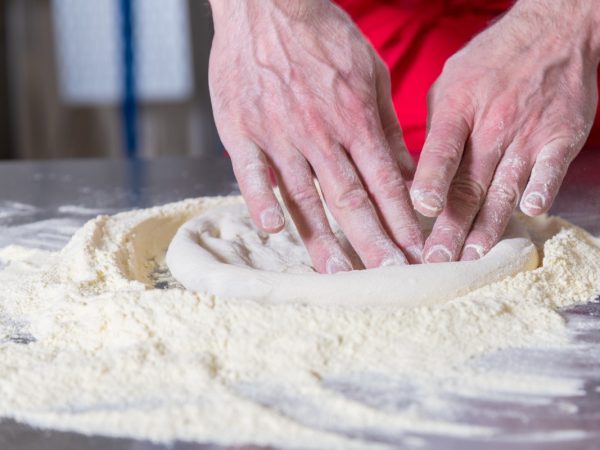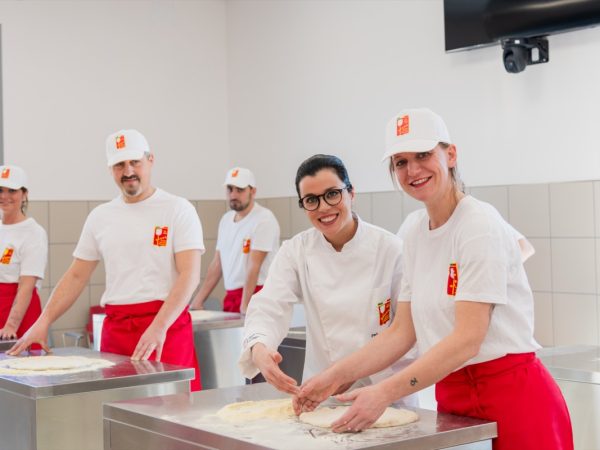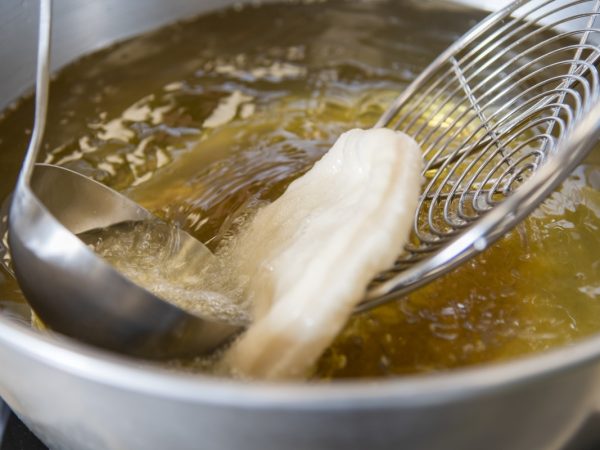Becoming a pizza maker allows you to be part of a professional category that is in high demand in the market. The program Professional Pizzaiolo 1st level aims to transmit theoretical and practical notions that are essential to knowing how to make a classic round pizza to perfection. The alternation of hours devoted to learning and perfecting practical skills with theoretical sessions will be fundamental to knowing how to reap the benefits from one’s work. The course is suitable for those who have no experience in the field or those who wish to acquire method and theoretical-practical knowledge to improve the product they already make.
Become the Pizza Maker of the Future: the courses
Showing all 8 results
- Professional Pizzaiolo Course 1st Level
- Advanced pizzaioli course
- Professional Pizzaiolo Course in Neapolitan Pizza and Fry Cooking
Professional Pizzaiolo Course 1st Level
What you will learn
The ability to choose the right flours for the type of dough you want to make and the related techniques for preparing, maturing, spreading, stuffing, and baking classic round pizza.
Duration
40 hours total, divided into 5 days: 10 hours of theory and 30 hours of practice.
9 a.m. to 5:30 p.m.
Language
Italian
Course Schedule.
Theory
10 hours
- The main cereals and their differences: wheat and its genetics
- Flour: chemical/physical characteristics
- Water and analytical parameters: calculation of temperature and its management in doughs
- The action of yeast: commercial yeasts, characteristics and functionality
- Carbohydrates and enhancers
- Salt and oil: their importance
- The equipment: work tools, mixers, ovens and refrigerators
- Types of ovens: electric, gas, and wood-fired and how they work
Practice
30 hours
- Preparation of classic pizza dough
- Management of direct, semi-direct and indirect doughs
- Breaking and forming of loaves of bread
- Handling and spreading the dough
- Refrigerated control dough management
- The value of ingredients
- Drafting practice with different techniques
- Kiln management and firing at different temperatures and analysis of results
- Theoretical and practical examination
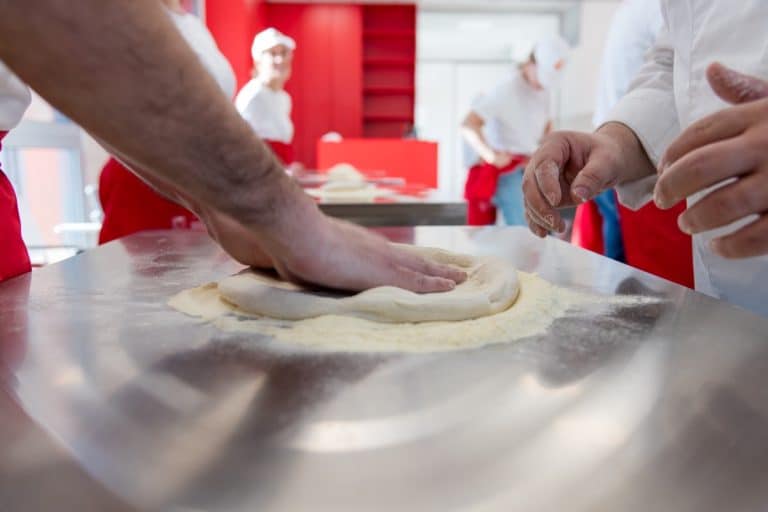
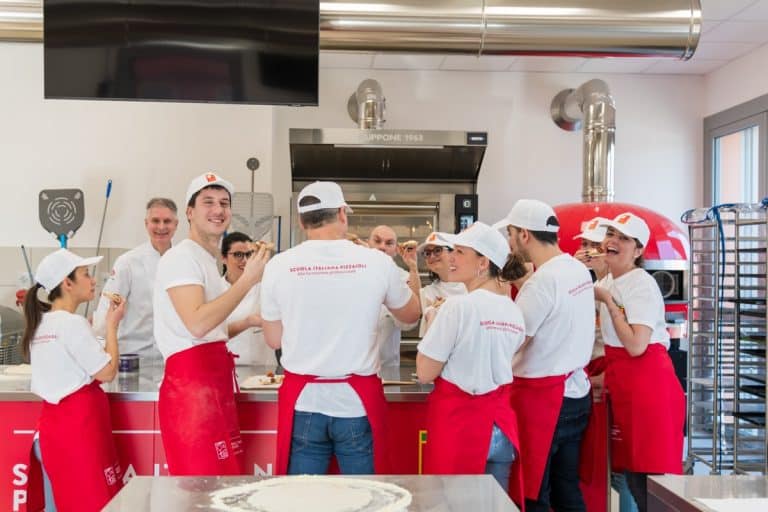
Advanced pizzaioli course
Becoming a pizza maker allows you to be part of a professional category that is in high demand in the market. The course Professional Advanced Pizzaiolo aims to convey theoretical and practical notions that are essential for an increasingly demanding market. The program is structured by alternating hours devoted to learning and perfecting practical skills with theoretical sessions, which are essential for gaining the right awareness and knowing how to reap the benefits from one’s work. The course is suitable for those who have attended the Professional Pizzaiolo 1st level program or have already gained experience in the field and wish to acquire theoretical and practical knowledge that can complete their professional preparation.
The course is aimed at. Those who wish to deepen and perfect their theoretical-practical preparation through a comprehensive course that allows them to refine their technical skills through the acquisition of content and methodologies of great professional value. To those who want to better manage and organize their business or elevate their preparation.
What you will get
An in-depth level of knowledge and training on different dough types, pizza styles, production techniques, raw materials as well as a focus on the managerial aspects that are fundamental to a restaurant business.
Duration
120 hours total, divided into 15 days: 40 hours of theory and 80 hours of practice.
9 a.m. to 5:30 p.m.
Language
Italian
Course Schedule.
Theory
40 hours
- Historical background on pizza
- Introduction to cereals with and without gluten
- In-depth study of soft wheat and durum wheat: differences, characteristics, factors determining quality and use in pizzerias
- Wheat caryopsis composition
- Mill processing stages
- Flour composition with description of its elements
- Vitamins and their importance
- Directions on the bag and how to store it properly
- Laboratory equipment to determine the quality, W, and energy of flour
- The importance of the elements that make up the dough and the sequence of insertion
- Dough rising and maturation processes: the differences
- Maillard’s reaction and digestion of foods
- Kneading methods: direct short and long rise, indirect biga – poolish and autolysis
- Flours used with description
- Equipment:
- Indispensable working tools
- Commercial kneading machines and their differences
- Wood-fired, electric, tunnel, and gas ovens: differences in modes of use
- Pizza baking: oven temperature and biochemical phenomena
- Managing and controlling the numbers: food cost, raw material cost, the true cost of production, and the true profit margin of your venue’s dishes
- The value of raw materials. The correct approach to sustainability, territoriality and seasonality in fresh or preserved products of use in pizzerias
- Bread in pizzerias: theoretical introduction and production of different types of bread to be made in pizzerias
- Verification test with theoretical examination
Practice
80 hours
- Making short and long rising, direct and indirect doughs with poolish, biga and autolysis for classic round pizza
- Making Contemporary Neapolitan pizza with direct and indirect doughs with biga
- Making Neapolitan dough required by STG specification
- Making dough by indirect method for the frying pan
- Making indirect doughs with different biga for shovel pizza
- Making direct and indirect doughs for pan pizza and focaccia
- Making direct and indirect doughs with alternative flours: whole wheat, integrated type 1, ancient grains, whole wheat semolina, mixsoy, low carb (cereal), black carrot dough, spinach, spirulina and beet.
- Implementation of bread in pizzeria in multiple forms: Italian-style filoncino, ancient grains, cereals, basket bread, pugliese, baguette and rosette
- Control and management of dough temperatures
- Loaf formation (staglio)
- Management of leavening and ripening at both room temperature and controlled temperature
- Refrigerator management for proper storage of dough
- Techniques for rolling out the dough disk and calibrating the sauce
- Line management for the service
- Oven management for the different types of pizzas prepared
- Kiln management and firing at different temperatures and analysis of results
- Work organization for next day and cleaning
- Verification test with practical examination
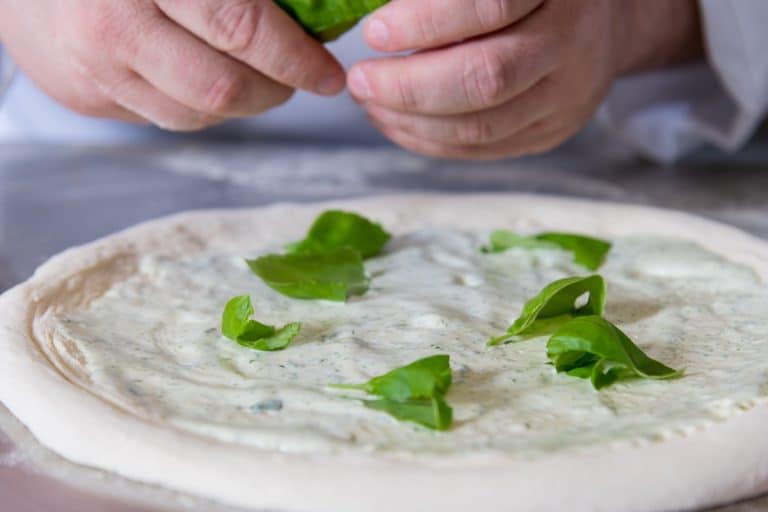
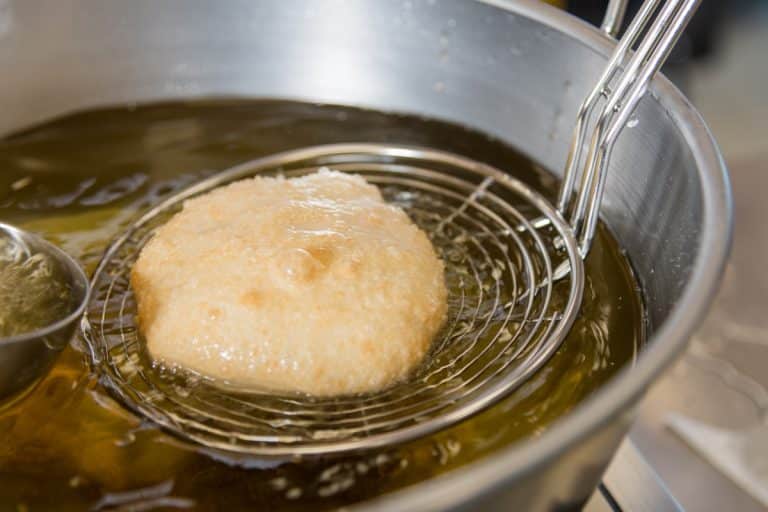
Professional Pizzaiolo Course in Neapolitan Pizza and Fry Cooking
Becoming a pizza maker allows you to be part of a professional category that is in high demand in the market. The program Professional Pizzaiolo – Neapolitan Pizza and Frying. aims to transmit theoretical and practical notions that are indispensable for knowing how to make a Neapolitan pizza to perfection. The alternation of hours devoted to learning and perfecting practical skills with theoretical sessions will be fundamental to learning all the secrets of typical Neapolitan pizza and frying. The course is suitable for those who have attended the Professional Pizzaiolo 1st level or to those who wish to acquire method and theoretical-practical knowledge to improve the product they already make.
The course is aimed at. Those who wish to undertake training to learn production technique, dough management, Neapolitan-style rolling and traditional cooking. To white art professionals, restaurant owners who want to deepen the technique, practice and knowledge needed to best work with Neapolitan pizza and traditional frying.
What you will learn
We will take a journey through the secrets of the world’s most iconic pizza and you will be guided through the study of the Pizza Napoletana STG, obtained in absolute compliance with the European Union’s Traditional Specialty Guaranteed specification, and then address the new trends that have brought evolution in terms of doughs, cooking and recipes. The course aims at high professional training of pizza makers on the techniques of production and processing of Neapolitan pizza dough, traditional frying and, with the support of chefs, they will learn about combinations that will make pizza an extraordinary dish.
Duration
40 hours total, divided into 5 days: 10 hours of theory and 30 hours of practice.
9 a.m. to 5:30 p.m.
Language
Italian
Course Schedule.
Theory
10 hours
- Historical background on pizza
- Mention of cereals with and without gluten
- In-depth study of soft wheat and durum wheat: differences, characteristics, factors determining quality and use in pizzerias
- Wheat caryopsis composition
- Mill processing stages
- Flour composition with description of its elements
- Laboratory equipment to determine the quality of flour
- The importance of the elements that make up the dough and the sequence of insertion
- Dough rising and maturation processes: the differences
- Maillard’s reaction and digestion of foods
- Kneading methods with recipes
- Essential work equipment
- Commercial kneading machines and their differences
- Wood-fired, electric, tunnel, and gas ovens: differences in modes of use
- The specification of Pizza Napoletana STG: the ingredients, specific method of production and processing
- Pizza baking (oven temperature and biochemical phenomena)
Practice
30 hours
- Making the dough by hand and using kneading machines by inserting the ingredients in the correct sequence
- Making Neapolitan dough STG
- Realization of Neapolitan direct mass dough
- Making indirect doughs for contemporary pizza
- Control and management of dough temperatures
- Loaf formation (staglio)
- Management of leavening and ripening at both room temperature and controlled temperature
- Techniques for rolling out the dough disk and calibrating the sauce
- Production and cooking techniques of some typical Neapolitan frying preparations
- Preparation of doughs with combinations of typical ingredients with the support of the Chef
- Creation of a traditional Neapolitan fry menu
- Wood-fired and electric oven management, cooking at different temperatures, and analysis of results
- Verification test with practical examination
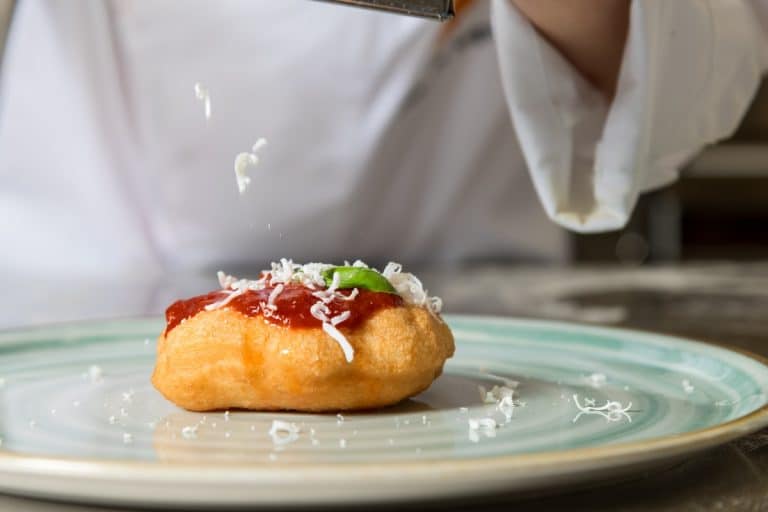
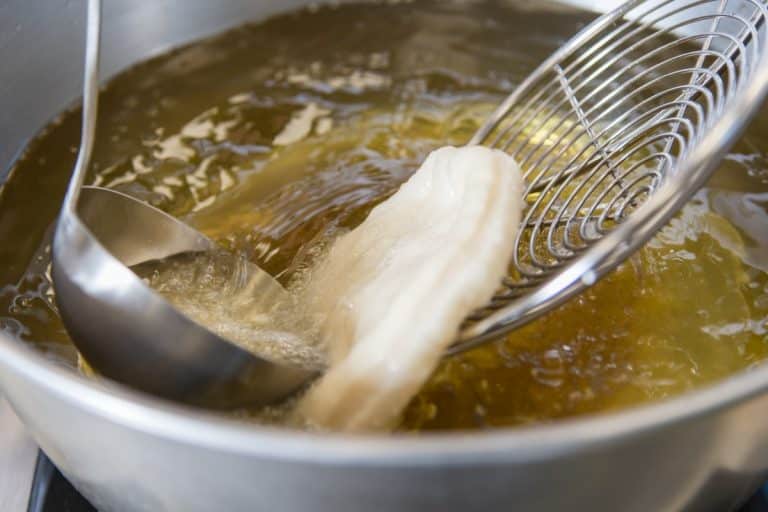
Available courses
Available courses for your selection
-
Next date: 01/09/2025
PROFESSIONAL PIZZAIOLO 1ST LEVEL
-
Next date: 08/09/2025
PROFESSIONAL PIZZAIOLO – ADVANCED
-
LecceNext date: 22/09/2025
PROFESSIONAL PIZZAIOLO 1ST LEVEL
-
BitontoNext date: 20/10/2025
Professional pizzaiolo 1st level
-
Padova (Curtarolo)Next date: 06/07/2026
PROFESSIONAL PIZZAIOLO IN NEAPOLITAN PIZZA AND FRY COOKING
-
OstiaNext date: 16/03/2026
PROFESSIONAL PIZZAIOLO 1ST LEVEL
-
Padova (Curtarolo)Next date: 01/12/2025
PROFESSIONAL PIZZAIOLO 1ST LEVEL
-
Padova (Curtarolo)Next date: 06/03/2026
PROFESSIONAL PIZZAIOLO 1ST LEVEL – ENGLISH
